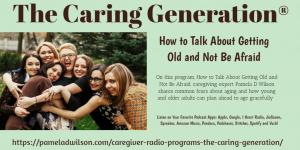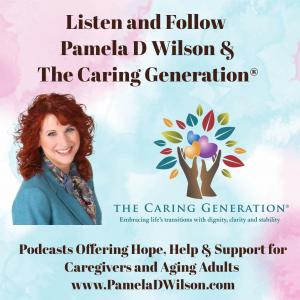Caregiving: How to Talk About Getting Old and Not Be Afraid
When adult children are in the role of caregiver for a parent, few discussions occur about how aging and care needs affect the entire family.
GOLDEN, CO, USA, March 11, 2021 /EINPresswire.com/ -- Adult caregivers view caring for aging parents as an isolated event. Little thought is given to relate the present care situation to getting old and planning for care needs. Many caregivers—trying to cope with the day-to-day of caring for elderly parents—fail to think or plan for when they will need care and help from their children or other family members.
Gaining an understanding of the stages of caregiving can add a new perspective to interest in caregiver support or education programs. The emotional stress of caregiving is significant because the time commitment and responsibilities affect career, family life, children, health, goals, social activities, and all areas of life.
Balancing the aspect of taking on more responsibility for the care of elderly parents while supporting the rights and dignity of parents to make decisions can be unsettling. While many parents say they don't need help or care, help is needed.
Lack of Healthcare Education Beginning In Youth Leads to Significant Health Concerns in Middle and Old Age
The absence of education in schools about the long-term effects of health beginning in youth translates to increased care needs and costs when older. Unexpected health issues in middle-age derail expectations about enjoying life after retirement.
Instead of having more time for leisure activities and travel, older adults spend more time dealing with chronic health concerns that negatively impact physical abilities. Elderly, without savings to pay for care at home in the United States, live in nursing homes funded by the government at an average cost of $10,000 USD per month at the end of their lives.
The consequences of health conditions and mental health concerns rarely discussed—are significant factors for aging well and aging positivity. COVID has taken a toll on physical and psychological health as consumers have delayed medical care, treatments, and routine care. The need for family caregivers is rising steeply as aging parents need care.
Long-Term Care Systems Plug Gaps Instead of Solving Root Problems
In the United States, Medicare and Medicaid are the primary funders of long-term care for the elderly. As the aging population rises, more and more money will be required to fund care. Conversations about being old and frail are uncomfortable in families and not supported by society or appropriately by public policy.
The issue of aging will continue to grow. Investing in healthcare education for the young and continuing this education throughout life is the only way to impact long-term care systems that will become financially unsustainable. If discussions about how everyday actions—nutrition, activity, and attention to health—begin early, conversations about how to talk about getting old and not be afraid will be more likely to occur in families.
The United States claims to have one of the best healthcare systems, yet a low percentage of the population attends annual medical-check ups. Countries like England, Canada, and Australia are sensitive to geriatric healthcare care concerns. Identifying health concerns early and the consequences of taking or not taking action is a preventative factor for all persons that can positively impact long-term care costs.
Isolated Seniors Are at Higher Risk of Health Concerns
Aging and social isolation increase the risk factors for chronic disease. The number of adults over age 60 is growing throughout the world. Many aging households are couple households where the healthy spouse cares for the sick spouse.
Adult children may or may not realize that elderly parents are showing signs that help may be needed—or may not be available to help. Family members who lack recognition of the role of caregiving lack awareness that caregiver support and education exist. Preventative actions to prevent further declines in aging parents' health and daily abilities are missed.
Support to Manage Daily Living Need Is Needed
Concerns about strangers coming into the home—including in-home care support—have resulted in the elderly not receiving needed care. Worries about COVID spreading like wildfire in elderly care communities, especially nursing homes, have resulted in fear and delays in moving parents into communities. Many adult children have stepped up to provide support or moved parents to live with them.
How to talk about getting old and not be afraid can be accomplished by initiating family discussions about care needs. For adult children, talking about care needs includes taking an interest in health and well-being to avoid chronic diseases with long-lasting effects.
End-of-Life Care and Decision-Making
Medical treatments and advancements may extend life but not improve the quality of life. Talking about care desires and wishes with elderly parents can reduce guilt for family caregivers, many of whom are unsure how to manage care. End-of-life care discussions can be challenging because illness and death are unpleasant topics.
Medical treatments begun earlier in life like pacemakers or dialysis are likely to bring up other concerns five, ten, or twenty years later when other advancing health issues result in more significant complications. Being proactive to request information about the consequences of medical care and treatments can help families become more comfortable talking about the realities of aging and needing care.
The Importance of Caregiving Conversations
Caregiving conversations are essential within the context of family life. While much focus is placed on marriage and raising children when young, elder care conversations must begin to occur within families, corporations, the healthcare systems, and governments. Instead of middle-aged children worrying about caring for elderly parents, working with caregiving experts to develop a care plan and understand options for care can help families make the best decisions.
Unique Education For Groups and Corporations
Wilson’s mission to reach one million caregivers worldwide is supported by her passion for working with groups and corporations to provide keynote speaking sessions, live or online presentations, webinars, unique online education courses, and online caregiver support discussions. A positive result of COVID is increasing awareness by global corporations of the needs and struggles of working caregivers related to elder care.
Contact Wilson for more information about caregiver support, resources, and education through her website by emailing Inquiry_For_Pamela@PamelaDWilson.com or calling +1 303-810-1816.
P Dombrowski-Wilson
Pamela D. Wilson, Inc.
+1 303-810-1816
email us here
Visit us on social media:
Facebook
Twitter
LinkedIn
How to Talk About Getting Old
Legal Disclaimer:
EIN Presswire provides this news content "as is" without warranty of any kind. We do not accept any responsibility or liability for the accuracy, content, images, videos, licenses, completeness, legality, or reliability of the information contained in this article. If you have any complaints or copyright issues related to this article, kindly contact the author above.



